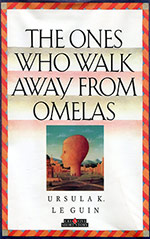
![]() rretzler
rretzler
2/11/2019
![]()
Ursula K Le Guin based this short thought experiment on the ideas of Fyodor Dostoyevsky and William James. In Omelas, everyone is happy...except for one child, who is locked away and lives in abject misery. All in Omelas accept that for the rest of the society to remain happy, the child must remain in misery. All, that is, except for those who walk away from Omelas.
Do the needs of the many outweigh the needs of the few? ...Or the one? What if the sacrifice were made by an adult instead of a child? What if instead of happiness, the choice were health instead? Would you walk away from Omelas? It's an interesting thought and not so farfetched as one might think. I believe this is something that happens in our society daily, except, of course, it is not one child or one person, but instead, many who are less fortunate in some way so that others can be more fortunate. I believe there are degrees here - the situation can be a deliberately horrific one like the story, or perhaps in some cases, not a choice, but a natural situation that can be improved. On the horrible side, all of the attempted genocides in the last century spring to mind, for example. However, there are those who suffer from disease or illness, and because of that suffering, cures are developed so that others can be healthy. If, however, the pain or illness is inflicted upon one purposefully, instead of happening naturally - like Mengele's experiments on the prisoners in Auschwitz - then the result is indeed atrocious regardless of the outcome. Of course, my words and thoughts don't do this story justice - you must read it for yourself.